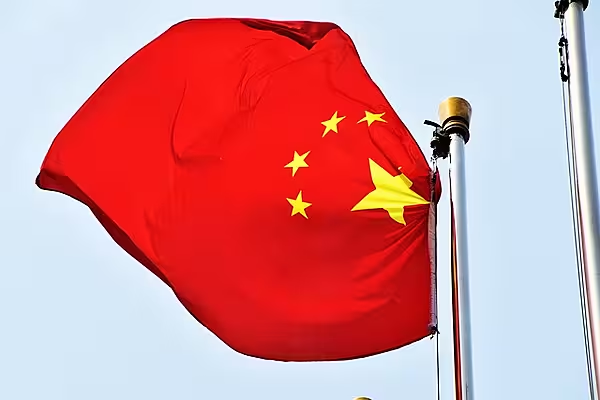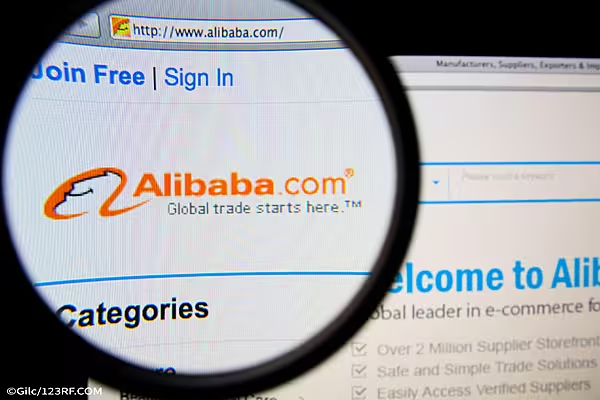JD.com Inc. agreed to sell its finance arm for 14.3 billion yuan ($2.1 billion) in cash while retaining a share of its future profits, part of a deal to spin off the fast-growing division and create a strong rival to billionaire Jack Ma’s Ant Financial.
The sale and spinoff of JD Finance, a payments and investment business, will be completed by the middle of 2017, the Beijing-based company said Thursday without naming buyers or investors apart from Chief Executive Officer Richard Liu. The co-founder said in November he intended to split finance away from its core e-commerce business, a similar structure to what Alibaba Group Holding Ltd. has with affiliate Ant Financial. A spokesman for JD.Com said the deal valued the spun-off unit at more than 50 billion yuan.
The deal was outlined as Wal-Mart-backed JD reported revenue that beat analysts’ estimates. A spinoff will create a financial services powerhouse capable of providing a host of loan, securities and insurance products, Liu told staff this year. It would help it gain necessary regulatory licenses by raising money solely from domestic investors. JD Finance last raised funds in 2016 at a valuation of about $7 billion.
The US-traded shares rose 0.9% to $30.93 Thursday in New York and have climbed 22% this year.
Hiving off JD’s entire 68.6% stake in JD Finance might also make the e-commerce operator itself more attractive to investors.
“Confirming the sale is positive because they’re generating cash for an asset that no one had really assigned a discrete value to,” said New Street Research analyst Kirk Boodry. “The financial risk that comes with JD Finance is not something that JD investors want to assume.”
A foray into online finance will pit JD’s payments arm against Ma’s Zhejiang Ant Small & Micro Financial Services Group, the largest of a growing crop of online finance players looking to serve smaller businesses and individuals traditionally neglected by state-run banks. JD will get 40% of JD Finance’s future pretax profits, an arrangement akin to the one Alibaba maintains with Ant. It has reserved the right to swap this for 40% of the finance unit’s equity in the future.
Under the deal, Liu will take about 4.3% of the unit, but maintain a majority of voting rights through proxy agreements.
Liu wants his corporate empire to become one of the 10 largest Fortune 500 companies within 12 years.
JD’s revenue hit 80.3 billion yuan for the three months ended December, beating the 76.7 billion yuan average of analysts’ estimates, as Chinese spending online grew alongside the country’s middle class. The net loss was 1.8 billion yuan, compared with projections for a loss of 1.6 billion yuan.
JD’s Chief Financial Officer Sidney Xuande Huang said the finance unit hadn’t received any funding from its parent company aside from an initial 2.1 billion yuan investment and a 10 billion yuan line of credit.
The new money will help JD strengthen its business as it wages what Liu called a "price war" in the fast moving consumer goods market, which includes groceries like soft drinks and toiletries. He told investors that JD would win the battle and had a history of beating competitors in price wars on books and household appliances.
"I recommend to my shareholders any time you hear about a price war with JD you should open a luxury brand of champagne and cheers to that because it means sooner or later we will be number one and it will be profitable and it can make a lot of money for our shareholders,” he said. “No war, no win, no profit and no worry.”
Both Alibaba and JD are now targeting rural China as urban markets become saturated. E-commerce in the countryside is expected to take off alongside rising smartphone and internet penetration, even as physical retail remains under-developed.
JD predicted revenue in the first quarter of 2017 would reach 72.3 billion yuan to 74.3 billion yuan, compared with the 73 billion forecast by analysts.
“The top-line growth was much better than we expected and an acceleration from last quarter,” Boodry said, adding the operating loss was lower than expected. “We still like the story.”
News by Bloomberg, edited by ESM. Click subscribe to sign up to ESM: The European Supermarket Magazine.














